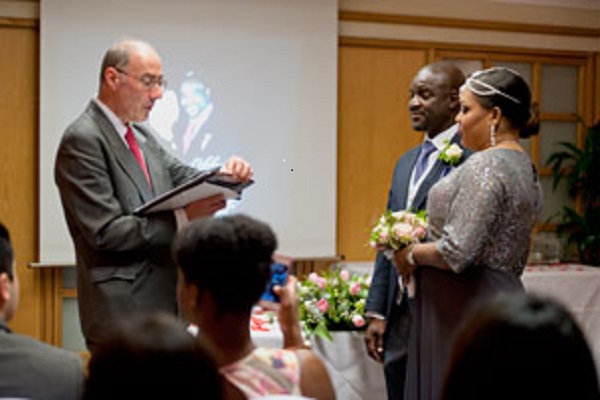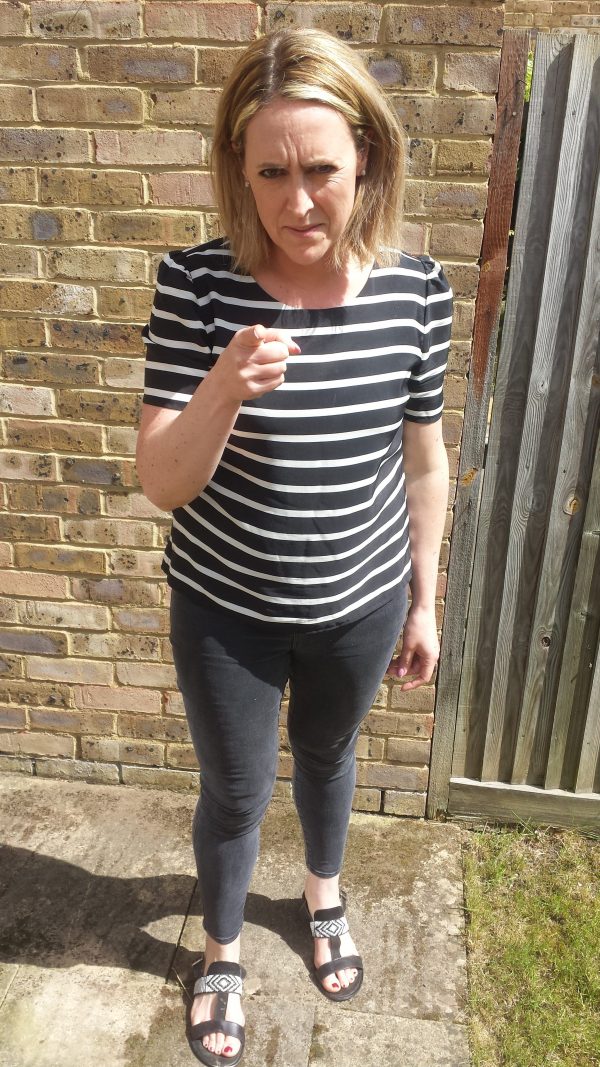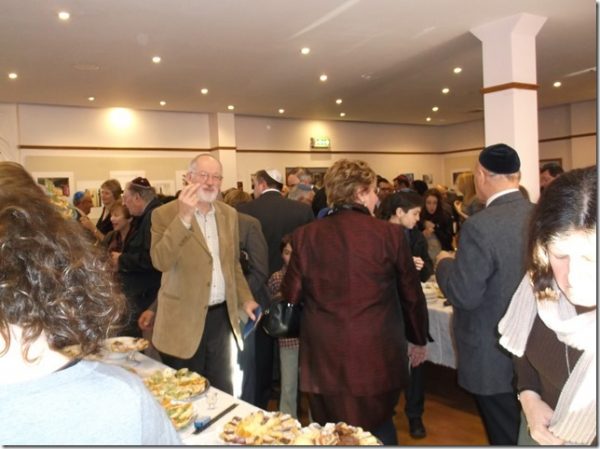
by Michael | Aug 27, 2019 | Blog
Weddings are
not what they were. That doesn’t mean that they are better or worse (whatever
that means) than traditional ones. It just means that there is more flexibility,
and it is therefore more difficult for me to be categorical.
One couple may have ideas who they want to participate in their event; another couple will have completely different opinions.
Without
being prescriptive, therefore, let me make a stab at defining the roles that
some people might play.
Bride and Groom
This is rather
more obvious!
The groom
will probably have a chance to welcome people as they arrive, so should not
neglect this duty – despite probably suffering with “butterflies”. He may well have
a few words to utter during the ceremony, but a lot more afterwards, if there
is a reception with speeches.
The speech
should thank both sets of relations and thank anybody who financed the wedding.
However, he should mostly be complimentary about his new wife!
The bride
will be the star of the show, of course, and her main task is to be
resplendent.
Either
during canapes (if offered) or during the meal, both bride and groom should
make an attempt to see everybody and thank them personally for attending.
As well as the groom, the bride may (or may not) have a speech to deliver.
Both may
well be expected to have at least the first dance together.
Bride’s Father
The bride’s
parents may well be footing the bill for (or at least be contributing to) the
proceedings.
It is customary for the bride’s father to welcome the guests briefly at the start of the reception and express what (we hope!) is his delight at the proceedings.
Best Man
I realise
that there are “best women” too these days, but, for the sake of simplicity, I
will refer here only to the male variety.
The Best Man
may have been involved with the preparations for some time, but, on the day, he
will be the person who liaises between the couple and the suppliers. He should
help keep the groom calm. He may have to do a favour for the groom (fetch some
water, check there’s a microphone functioning, inform the musicians that it’s
time for the entry music, or whatever).
The Best Man
may also serve as a toastmaster (“please go outside for the photographs now”
etc.).
His main
public role is probably to deliver his speech at the reception. This can be
about 10 minutes long, and, although it will presumably focus on the groom,
should not be exclusive. (Half the guests may well not know the groom.)
The speech
should be humorous (but not crude or controversial) and, while poking some fun
at the groom, should not be cruel.
Other roles
Flower-girls, bridesmaids, ushers (or groomsmen) and so on may well be included. The first two are primarily part of the procession (in and, sometimes, out), and, to quite an extent are there to look pretty and enhance the bride’s appearance. They may help with the bride’s train. Ideally, they also need to be able to walk very slowly!
The ushers
may be quite active (collecting gifts, for example, or doing errands and tasks
on the day). They may direct guests to their places and be on hand to answer
questions.
Or they might
get away with an ornamental role!
How much or how little the roles matter nowadays is down to how traditional the wedding will be. It’s certainly good to honour friends and/or relatives by including them in your ceremony. Just make sure they know what is expected of them!
You can always have a chat with your celebrant, if you’re not sure how to go about things.

by Michael | Jul 29, 2019 | Blog
This used to be an easy question to answer. Traditionally, it
was down to the bride’s parents to pay for the wedding. End of story. All to do
with historic dowries, and the bride paying for the privilege of finding a husband.
Whatever the reason, this tradition is still with us to this day.
However, the groom’s parents often accept that that is unfair. It’s undeniable: weddings cost a lot. Perhaps financial reasons will hamper the bride’s parents from putting on a fitting ceremony. Then, of course, the groom’s parents may simply want to pay their share of the ceremony. After all, it involves their son just as much as it involves the bride.
A relatively new element needs to be taken into consideration. That is the marital couple themselves wanting to pay for or, at least, contribute to, their wedding. A lot of people marry later these days. That often means that the couple have been able to save up and can now afford to be (at least) part of the financial equation.
One huge consideration about who pays for the wedding is control. After all, if somebody is forking out several thousand pounds on your behalf, you are likely to feel indebted to them. That means that they are in the driving seat. They can have the final say on the type of celebration that you will have. They can certainly have major input on thorny issues such as how many guests to invite – and who these might be.
The recipients have to show tolerance and patience. They may be lucky: their wishes may be taken into consideration and the sponsors may remember that the ceremony is actually for the couple, rather than for them. Then there can be parents, who virtually hold the couple to ransom – “if you don’t do exactly what we want, the money dries up!” In my experience, this really can happen, although it is not the rule.
In most cases, compromise wins the day. But it worth
clarifying expectations (on both sides) before the process actually begins.
If a visit to parents from a civil celebrant could be useful, Michael would be happy to help out.

by Michael | Jun 24, 2019 | Blog
Nobody
relishes being classed as a “bridezilla”, but there do seem to be a few around …!
As a civil celebrant of some seven years’ standing, I have experienced one or two in my time! However, I’m glad to say that they have been the exception, rather than the rule.
What is it?
A bridezilla
is basically somebody who is totally self-centred. They are only concerned with
their own aspirations and desires.
An example
I came across a fine one a few years ago.
I had received an enquiry about a wedding in Essex, which I was available to do. We needed a discovery conversation to see if we could work together.
The lady concerned chose a Skype call, and it was all set up. Unusually, she conducted it on her own. I wasn’t particularly enamoured of her, in truth, but brides are entitled to be demanding, and it looked like I would be able to offer what she wanted.
After a
while, I saw a man slinking around in the background, and I asked her if that
was her intended. Indeed, it was. So I asked her if she’d like to invite him to
be part of our conversation.
“Oh, no,” she responded, “He’ll do what I tell him. This is my wedding.”
I wasn’t impressed. Needless to say, there wasn’t any future in our collaboration!
A different example
One other
experience comes to mind. By contrast to the Essex wedding (if it ever took place!),
I was invited by the groom to come over to his office discuss how we might do the
wedding.
I seemingly ‘passed the interview’, as I was next invited to their home to meet the bride. Their home turned out to be in a close off London’s Bishop’s Avenue. (Some will now realise that we are talking serious money here.)
The groom was delightful; the bride rather unsmiling, although she was pleasant enough. It became clear that she had OCD tendencies! One thing that I did not expect was for her to record me reading aloud, and send the recording off to her parents for approval.
When I got the job, and I had written the final draft, I had to go over again for a rehearsal, where every detail was checked and refined. The bride was even more unsmiling this time!
I could understand that she wanted her society wedding to be perfect, but this was nothing compared with what I saw at the weekend of the wedding.
The day before, another rehearsal had been arranged, and we got through this, even though the bride was showing real signs of stress. She found fault with most things, and, when her groom was unwise enough to intervene in the interests of fairness, she turned on him quite viciously.
An hour or so before the ceremony, I was invited to their suite. The bride seemed to be at war with the world. Almost everybody was the recipient of her tongue (I got away with it quite lightly!), but the blame for everything was laid at the door of the groom.
She shouted at, and humiliated, him in front of make-up artists, florists, myself, and all and sundry. Certainly, had I been the groom, I would not have married her!
In the event, the day went smoothly and beautifully, and she was able to enjoy the event (and let others enjoy it too!).
Dealing with Bridezilla
Once again, I acknowledge that weddings are stressful for anybody. You want to make a great impression and have a fabulous day. You engage a team of people to collaborate, and depend on their skill and professionalism. Things can go wrong (although they may be resolved seamlessly), but don’t necessarily matter at all. (Except to a Bridezilla.)
I escaped the worst of the maelstrom by showing calmness and confidence. (Not to say I wasn’t nervous, though!) I didn’t interfere in what didn’t directly concern me, and had to let the bride blow her top as and when.
I do think it was a pity that the bridezilla probably spoiled the wedding for the groom (certainly, the run-up) by being so demanding and nasty. However, as far as I know, they are still married, so there is probably a happy ending to this story after all!
If you know
anybody who might like to work with a consummate professional for their big
ceremony, please send them my way. But think twice, if they’re a Bridezilla!

by Michael | May 11, 2018 | Blog
There’s certainly a wedding guest etiquette, but it’s often unspoken. How, then, is one to know what to do and what to avoid?
Some guest etiquette is common sense. But thoughtlessness sometimes enters into it.
I know, as a celebrant, that being a guest can sometimes prove to be less than simple.
If you’re not careful, you can get it wrong – and, potentially, months before the big day!
RSVP
It’s easy to put off responding to the invitation because you’re want to be sure you are free. (Or because you forget about it!). But consider those making the arrangements. They have to book all manner of things (not least, the venue and catering), and this has to be done well in advance. Deposits need to be paid. They need to know numbers fairly soon.
If you’re able, then be one of those who responds as soon as possible.
Tweaking The Invitation
You may want to bring your child(ren), but if there is no mention of them on the invitation, then accept it. (It’s not meant as a snub, but there simply have to be limits on the numbers invited.) Obviously, the same goes for other people you may feel should be invited.
You may have a new partner, but don’t assume you can bring them. (For one thing, you might disrupt the seating plan.)
Participating
You could get asked to take on a role at the ceremony. Maybe as bridesmaid or usher. It’s an honour, so make sure you find out well in advance what the expectations are of your role. Will you have to attend a rehearsal the day or morning before or wear particular attire?
If you don’t want to (or can’t) do it, then give maximum notice Then there’s time to replace you, if necessary.
On the Day – Punctuality
Arrive well (30 minutes?) in advance – and don’t upstage the bride by a tardy, flustered entry. If you have been delayed, then you should simply wait until the end of the ceremony – just don’t interrupt it.
If you’re the Best Man, you should arrive an hour before the ceremony starts. If you’re going to be late, try and call the groom, at least, and warn him.
Dress
You will normally be given guidelines in the invitation. Go with what you are asked to wear, even if you might prefer a different style of attire.
At the Ceremony
Ushers may show you to your seat. If that’s not the case, leave the front two rows free for the family and VIPs.
Is the Ceremony “Unplugged”?
There will probably be an official photographer in attendance and his/her photos will matter a lot to the couple. It would be far better if they could show your smiling face rather than an iPhone held in the air. Take photos after the ceremony, by all means. Always respect any requests in this regard in the invitation or on the day.
Behaviour
It should go without saying that you ought to drink responsibly afterwards (and even more so, if you start before the ceremony!). Likewise, don’t trash the venue or embarrass yourself or the couple by loud or aggressive behaviour.
This is the biggest day in your friends’/relatives’ lives, so be grateful that they have chosen to include you. Enjoy the day – and enhance it for the happy couple. Make them glad they invited you!

by Michael | Mar 12, 2018 | Blog
Wedding day stress is to be expected. Of course, it is. However much you may have prepared, you don’t know what might actually happen … Even if you’re using a wedding planner, you can’t quite be sure.
All you can do, when all is said and done, is to ensure you have prepared carefully. Have you covered most eventualities? If you have, the chances are that everything will go smoothly, and there’s no point you getting uptight.
If something does go wrong, there are people who will bust a gut to sort it out for you.
There’s certainly no point upsetting yourself (and others!) by worrying. It is supposed to be your big day, and you do want to enjoy it. Don’t let what might not even happen spoil it.
Be ready on the day
Assuming you have booked and confirmed your suppliers, there are only a limited number of jobs that need to be done on the day. Let’s assume the bride’s hair, nails, make-up and dressing are under control!
Bride
Final assumption: you will have done a rehearsal (or talked it through) and you (and your retinue) know what you have to do when you process in at the beginning of the ceremony.
Give your Maid of Honour a small emergency kit (needle and thread, paracetomol, cough sweet etc.) to look after.
If you are not staying at the venue, ensure you leave plenty of time to get there (even if you plan to arrive late!). (More on this subject presently.)
Groom
Apart from looking elegant, your sole duty, probably, is to bring the rings and hand them to your Best Man.
You need to arrive early – mainly to ensure (probably, in collaboration with your civil celebrant) that everything is ready for the ceremony, and (with the groom) for the reception.
I had booked a taxi a week before my wedding and reconfirmed the night before. It still never showed up, and I had to book another one with immediate effect. Because I had booked the original minicab for a rather ridiculous hour, it wasn’t an issue. However, that was stress I could have done without!
Best Man/Maid of Honour
Both need to arrive punctually for their respective functions.
The Maid of Honour normally has to reassure and organise the bride.
The Best Man may have the rings already, or may have to remember to get them! Once at the venue, he needs to check in with the venue’s wedding planner (if there is one). The groom may well be early too, and may need a smile and an arm round his shoulder. Of course, the groom may ask you for certain errands. Do them with good grace.
The civil celebrant (if used) should be arriving very early too, so he/she will check that everything is in place for the ceremony. You may be kept in the loop, or not. Likewise, with the reception arrangements.
Stress-free!
So the key to a successful ceremony is preparation, first of all. Then it’s usually a case of responding calmly and positively to a mishap.
Odds on, the mishap is not a disaster (although, I admit, one ceremony I conducted was rather interfered with by a [small] fire!). People rally round, and most of your guests accept that things do happen beyond our control.
So what seems awful to you, may be a passing inconvenience to your guests.
The good news is that the majority of mishaps are not even noticed. And actually, a mishap is the exception, certainly not the rule.
So, what are you worrying about?!
For more advice or suggestions, contact Michael.





